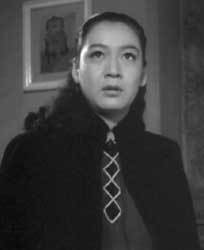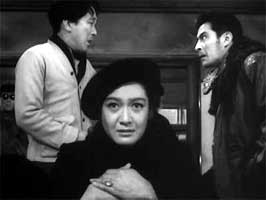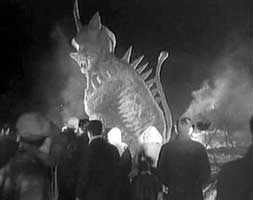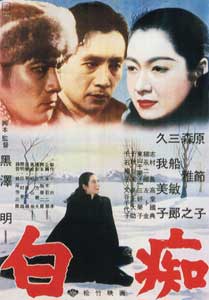 Akira Kurosawa was inspired by more than he adapted Dostoyevsky's novel as The Idiot (Hakuchi, 1951). Having just finished Rashomon & with Seven Samurai to follow, The Idiot is simply not the equal of his masterpieces.
Akira Kurosawa was inspired by more than he adapted Dostoyevsky's novel as The Idiot (Hakuchi, 1951). Having just finished Rashomon & with Seven Samurai to follow, The Idiot is simply not the equal of his masterpieces.
Some few will mistake the film's pretensions for brilliance & those are the few who should track it down. It was a commercial dud in its day & nothing about it suggests it was ahead of its time.
Yet it was a film Kurosawa felt extremely close to & infused not only with his love of Russian literature, but also with his personal feelings about the recent war & the meaning of life & all that.
Even before getting the go-ahead on the film, he would carry Dostoevsky's novel about with him, consulting it much as religious fanatics consult the Bible. He found some echo of his own deep gloom embodied in the prose.
From this inflated sense of importance he constructed a pompous work of cinema. And unless the viewer is interested in pschoanalyzing the director for his own obsessions, the film per se has only the faces & shadows to sustain interest. The visual exellence is undeniable.
If one weren't at all familiar with Dostoevsky, the film would seem liable at any moment to burst into a bloodfest of vampirism it is so thick with exaggerated premonition & paranoia of the expressionist horror type, & this promise of horror just never pans out.
 Denkichi Akama (Toshiro Mifune) on a train to Hokkaido befriends Kinji Kameda (Masayuki Mori) who was recently released from an Occupation detention center in Okinawa, where he nearly lost his mind when slated for execution for war crimes he did not commit. Denkichi Akama (Toshiro Mifune) on a train to Hokkaido befriends Kinji Kameda (Masayuki Mori) who was recently released from an Occupation detention center in Okinawa, where he nearly lost his mind when slated for execution for war crimes he did not commit.
It's the story of a good man in times that are not good, when one's lack of cruelty in a world universally cruel can make a man look mentally ill. Kameda becomes part of a Gothic love-triangle, he & Akama loving the same ex-prostitute Taeko Nasu (Setuko Hara). They are like a man of light (Kameda) & darkness (Akama) drawing her back & forth between them.
She's a sometimes-creepy "bad" woman whose toughness is really only self-protection, but whose confusion & self-hate is all so real that at times she can only strike out vengefully equally at the hearts of those who would love her or abuse her. Through his long film career, female characters were never Kurosawa's strong suit, but this is an undoubted exception, a fairly complicated victim of her times misusing her wiles to do unto others.
As a melodrama it often seems positively Victorian & is certainly overwrought, but ther are moments here & there when it gets to the heart even so.
It's a butt-punishingly long film with an intermission built into the middle, & strange to realize Kurosawa wanted it to be a hundred minutes longer. The insane knife sequence that ends Part I is truly shocking, though in general The Idiot is the opposite of an action film; it's an inertia film.
 Part II subtitled "Love & Loathing" pretty much sums it up, opening on a night-time ice-carnival scene of the snow country for further visual feast. Part II subtitled "Love & Loathing" pretty much sums it up, opening on a night-time ice-carnival scene of the snow country for further visual feast.
Kameda's performance as a wounded puppy is at times rediculous. The central notion that the two best looking strongest women in town would both fall for the same weakling is never completely convincing.
Mifune, the tough guy with a broad streak of decency that can barely show itself, is a more convincing & layered character. Thinking himself no good, he often lives up to his own low expectations.
For me the most boring scenes are when the greatest number of characters get together on stage & have their excessively stagy dialogues ripping into each others lives with verbal sparring & abuse, pulling long faces.
By contrast, the strongest scenes are between Akema & Kameda in Akama's gloomy spooky mansion, when murder seems a possibility at any abrupt moment, & the distinctions between friend & enemy completely break down.
I first saw The Idiot decades ago & remembered it as just so boring. But specifics had faded from memory & I kind of expected that having myself matured into a depressive curmudgeon as critical of the world as Kurosawa, I might actually be able to relate more to the film's downbeat self-importance. But no.
copyright © by Paghat the Ratgirl
|

